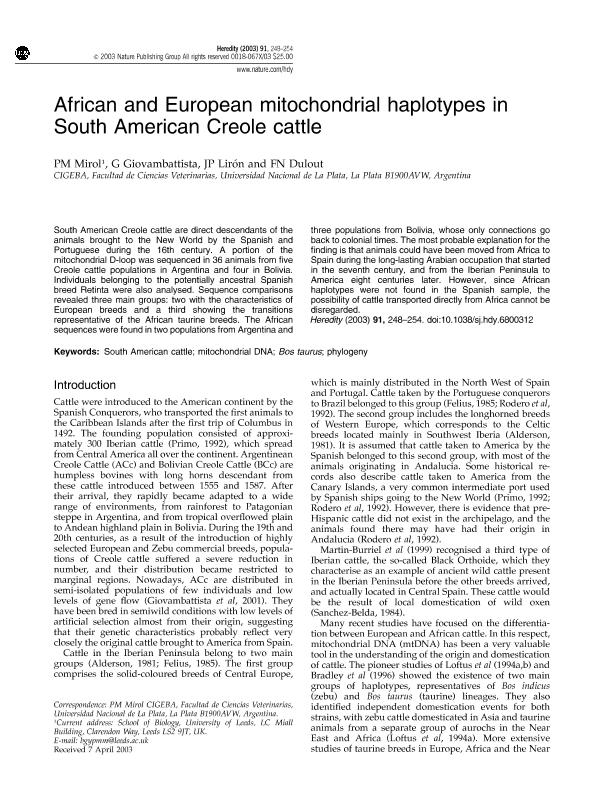Artículo
African and European mitochondrial haplotypes in South American Creole cattle
Fecha de publicación:
09/2003
Editorial:
Nature Publishing Group
Revista:
Heredity
ISSN:
0018-067X
e-ISSN:
1365-2540
Idioma:
Inglés
Tipo de recurso:
Artículo publicado
Clasificación temática:
Resumen
South American Creole cattle are direct descendants of the animals brought to the New World by the Spanish and Portuguese during the 16th century. A portion of the mitochondrial D-loop was sequenced in 36 animals from five Creole cattle populations in Argentina and four in Bolivia. Individuals belonging to the potentially ancestral Spanish breed Retinta were also analysed. Sequence comparisons revealed three main groups: two with the characteristics of European breeds and a third showing the transitions representative of the African taurine breeds. The African sequences were found in two populations from Argentina and three populations from Bolivia, whose only connections go back to colonial times. The most probable explanation for the finding is that animals could have been moved from Africa to Spain during the long-lasting Arabian occupation that started in the seventh century, and from the Iberian Peninsula to America eight centuries later. However, since African haplotypes were not found in the Spanish sample, the possibility of cattle transported directly from Africa cannot be disregarded.
Palabras clave:
BOS TAURUS
,
MITOCHONDRIAL DNA
,
PHYLOGENY
,
SOUTH AMERICAN CATTLE
Archivos asociados
Licencia
Identificadores
Colecciones
Articulos(CCT - LA PLATA)
Articulos de CTRO.CIENTIFICO TECNOL.CONICET - LA PLATA
Articulos de CTRO.CIENTIFICO TECNOL.CONICET - LA PLATA
Articulos(IGEVET)
Articulos de INST.DE GENETICA VET ING FERNANDO NOEL DULOUT
Articulos de INST.DE GENETICA VET ING FERNANDO NOEL DULOUT
Citación
Mirol, Patricia Monica; Giovambattista, Guillermo; Liron, Juan Pedro; Dulout, Fernando Noel; African and European mitochondrial haplotypes in South American Creole cattle; Nature Publishing Group; Heredity; 91; 3; 9-2003; 248-254
Compartir
Altmétricas




